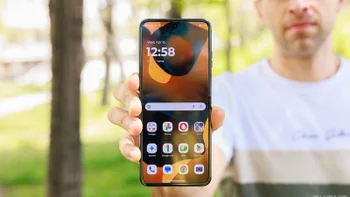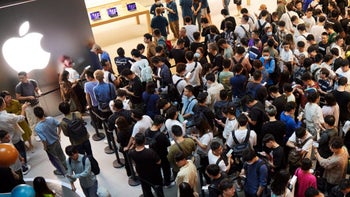Bad news from China could mean that Apple had a disastrous February in the country

While China might still be the largest market for smartphones in the world, business is definitely not booming. A new report issued today by the China Academy of Information and Communications Technology (via CNBC) reveals that Chinese smartphone deliveries in February declined more than 20% on a year-over-year basis. Three major factors might have been responsible for the decline. The Chinese New Year was celebrated in February this year, cutting into demand. Smartphone penetration in the country is high, and the economy in China is still reeling from the trade war with the U.S.
The 13.8 million units shipped in the month was the lowest number of smartphones delivered in the country going back to 2013. IDC's Beijing-based China senior market analyst Xi Wang, added that manufacturers traditionally ship more units to retailers than needed in January. This is done to get the year off to a "good start." With bloated inventories of phones at wholesalers and retailers, February shipments often decline on a sequential basis. But toss in the weak demand and you end up with the shockingly large decline from last February's numbers.
Another analyst, Neil Campling, head of technology, media and telecommunications research at Mirabaud Securities, blamed the lack of innovation for the decline. He called the foldable phones like the Samsung Galaxy Fold and Huawei Mate X "niche" products for the time being. He says that with smartphone prices as high as they are, users are extending the life cycles of their current handsets because "existing technology is good enough."
Counterpoint Research director Neil Shah said that Apple and Xioami were the biggest losers in China last month. Shah said that Huawei, Vivo and Oppo are taking market share away from the pair. Since there is no growth in the Chinese smartphone market, Shah calls it a "zero-sum game" and noted that the mid-range market is doing well. He pointed out that Huawei's Honor and Nova brands, and Oppo's A series phones are doing well in the country. The strength of these brands directly affects Apple since it reduces demand for premium phones in China. It also affects Xiaomi, whose value priced phones are losing out to well spec'd mid-range models.
Sales of the iPhone in China have also been affected by the strong dollar. This forced Apple to raise the local prices of its 2018 phones in order to maintain its profit margins. For example, the iPhone XR was originally priced higher in Chinese Yuan than Huawei's high-end Mate 20 Pro. Even though Apple cut wholesale prices in China, demand has also been negatively impacted by a boycott of Apple devices that followed the arrest of Huawei CFO Meng Wanzhou in Canada in December. The daughter of Huawei founder Ren Zhengfei, Meng was charged by the U.S. Justice Department in a scheme related to business that Huawei allegedly did with Iran in violation of U.S. economic sanctions.
Follow us on Google News













Things that are NOT allowed:
To help keep our community safe and free from spam, we apply temporary limits to newly created accounts: